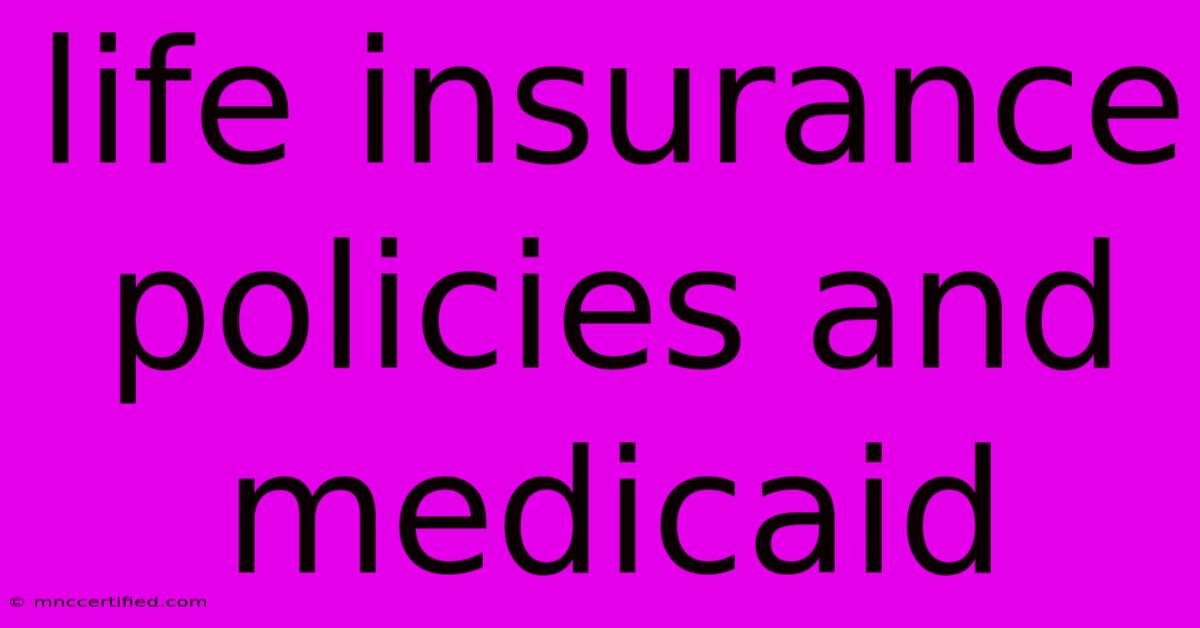Life Insurance Policies And Medicaid

Table of Contents
Navigating Life Insurance Policies and Medicaid: What You Need to Know
Life insurance can be a valuable asset, providing financial security for your loved ones after you pass away. However, if you rely on Medicaid for healthcare coverage, it's important to understand the potential impact of your life insurance policies. This article will delve into the complex relationship between life insurance and Medicaid, exploring key considerations for individuals and families.
Medicaid and Life Insurance: A Complex Connection
Medicaid, a government-funded healthcare program for low-income individuals and families, has specific rules surrounding life insurance policies. These rules are designed to prevent individuals from transferring assets to qualify for Medicaid benefits.
Key Considerations:
- Estate Recovery: One of the most significant factors is the Medicaid Estate Recovery program. This program allows states to recover Medicaid expenses from the estate of a deceased beneficiary. This means that a portion of the death benefit from your life insurance policy could be used to reimburse Medicaid for the costs of your care.
- Lookback Period: Medicaid uses a "lookback period" to determine if you've transferred assets to qualify for benefits. Typically, the lookback period is five years. If you have transferred assets, including life insurance policies, within the lookback period, you may be penalized.
- Irrevocable Trusts: Setting up an irrevocable trust can be an effective strategy to protect assets from Medicaid estate recovery. However, this is a complex legal process that requires expert advice.
Life Insurance and Medicaid: Different Scenarios
Scenario 1: Small Life Insurance Policy:
If you have a small life insurance policy, say under $15,000, it's unlikely to significantly impact your Medicaid eligibility. However, it's crucial to consult with a financial advisor or Medicaid expert to understand your specific situation.
Scenario 2: Large Life Insurance Policy:
Large life insurance policies, exceeding $15,000, require careful consideration. If you plan to leave the proceeds to your spouse or dependent children, these assets are generally protected from Medicaid estate recovery. However, leaving the proceeds to someone outside the immediate family may trigger Medicaid estate recovery.
Scenario 3: Life Insurance Policy as a Medicaid Asset:
If you have a life insurance policy that names Medicaid as the beneficiary, this policy will be considered a Medicaid asset. This means the death benefit will be used to reimburse Medicaid for expenses.
Strategies to Consider:
- Seek Professional Advice: Consult with a financial advisor or Medicaid expert to evaluate your individual situation.
- Consider Irrevocable Trusts: Irrevocable trusts can shield assets from Medicaid estate recovery, but they involve complex legal considerations.
- Understand Medicaid Rules: Familiarize yourself with the specific Medicaid rules in your state.
- Plan for Estate Recovery: If you anticipate Medicaid estate recovery, consider strategies to minimize its impact.
In Conclusion
The relationship between life insurance and Medicaid can be complex and depends on several factors. Careful planning and professional advice are essential to ensure your assets are protected and your loved ones are financially secure. By understanding the nuances of these programs, you can navigate the system effectively and make informed decisions regarding your life insurance policies.

Thank you for visiting our website wich cover about Life Insurance Policies And Medicaid. We hope the information provided has been useful to you. Feel free to contact us if you have any questions or need further assistance. See you next time and dont miss to bookmark.
Featured Posts
-
Capula Investment Management Careers
Nov 12, 2024
-
Best Countries For Airbnb Investment
Nov 12, 2024
-
Gary Linekers Final Match Of The Day Season
Nov 12, 2024
-
Robbie Williams Back At Edinburgh Rugby
Nov 12, 2024
-
Curtain Drama Lamb Shades Jones
Nov 12, 2024